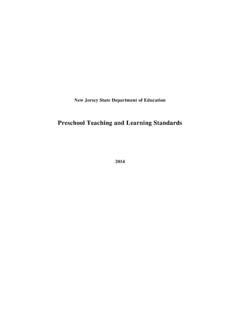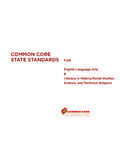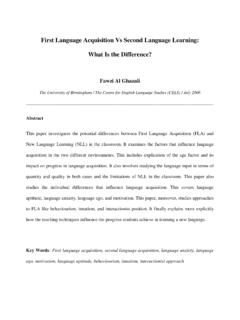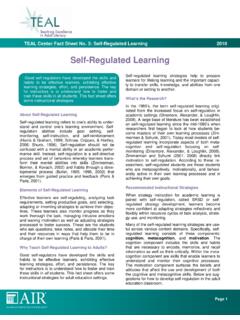Transcription of Helping Students Overcome Foreign Language Speaking ...
1 International Education Studies November, 2009. Helping Students Overcome Foreign Language Speaking Anxiety in the English Classroom: theoretical Issues and Practical Recommendations Iakovos Tsiplakides (Corresponding author). Nikis Street, Ioannina, Greece Tel: 30-265-104-9753 E-mail address: Areti Keramida MEd in TESOL, Greek Open University Iakovos Tsiplakides receives a scholarship from the State Scholarships Foundation in Greece Abstract Despite the fact that Foreign Language Speaking anxiety is a common phenomenon in the teaching of English as a Foreign Language in Greece, teachers do not always identify anxious Students , and often attribute their unwillingness to participate in Speaking tasks to factors such as lack of motivation, or low performance. This article aims to contribute to the literature on Language anxiety and to provide teachers with strategies for reducing Foreign Language Speaking anxiety stemming from Students ' fear of negative evaluation from their peers and perception of low ability.
2 Using qualitative research, it presents a classroom-based case study which aims at examining the characteristics of anxious Students with a view to implementing classroom interventions to reduce Foreign Language Speaking anxiety. The effectiveness of these interventions is also presented and evaluated, and the pedagogical implications of the findings are discussed. Keywords: Foreign Language Speaking anxiety, English 1. Introduction A negative correlation between second and Foreign Language anxiety and achievement is established in the literature (Horwitz, 2001; Aida, 1994; MacIntyre and Gardner, 1991). Empirical research shows that anxious Foreign Language Students are less willing to participate in learning activities, and have lower performance than non-anxious Students (Aida 1994, MacIntyre and Gardner 1991). Foreign Language anxiety consists of self-perceptions, beliefs, feelings and behaviors related to classroom Language learning arising from the uniqueness of the Language learning process (Horwitz, Horwitz and Cope 1986, 128).
3 Foreign Language learning process is a unique proccess, because learners are required to communicate using a Language which they have not mastered perfectly. Three components of Foreign Language anxiety have been identified (Horwitz, Horwitz and Cope 1986): a) communication apprehension, b) fear of negative evaluation, and c) test anxiety. Students who exhibit communication apprehension do not feel comfortable communicating in the target Language in front of others, due to their limited knowledge of the Language , especially in relation to Speaking and listening skills. Students who experience fear of negative evaluation do not consider Language errors as a natural part of the learning process, but as a threat to their image, and a source for negative evaluations either from the teacher or their peers. As a result, they are silent and withdrawn most of the time, and do not participate in Language activities (Ely 1986). Students who experience test anxiety consider the Foreign Language process, and especially oral production, as a test situation, rather than an opportunity for communication and skills improvement.
4 In order to measure Foreign Language anxiety, the Foreign Language Classroom Anxiety Scale (FLCAS) has been developed, a self-report measure which assesses the degree of anxiety, as evidenced by negative performance expectancies and social comparisons, psychophysiological symptoms, and avoidance behaviors (Horwitz 1986, 559). Many studies have addressed the relationship between Language anxiety and motivation. More specifically, integratively motivated Students are less anxious in second Language contexts (Gardner, Day and MacIntyre 1992, 212) than Students who Students who are instrumentally motivated. Their research findings provide indications that anxiety and motivation are two separate dimensions with overlapping behavioral consequences (Gardner, Day and MacIntyre 1992, 212). Six types of sources of Foreign Language classroom anxiety have been identified (Young, 1991): personal and interpersonal anxieties, learner beliefs about Language learning , instructor beliefs about Language learning , instructor-learner interactions, classroom procedures, and testing.
5 39. Vol. 2, No. 4 International Education Studies Apart from general Foreign Language classroom anxiety, many learners are highly anxious with respect to participation in Speaking activities. Indeed, it is often suggested that Speaking is the most anxiety-provoking aspect in a second Language learning situation (Cheng, Horwitz, and Schallert, 1999: 420). An examination of sources of Foreign Language Speaking anxiety showed a correlation between a) anxiety and fear of negative evaluation, and b) anxiety and perception of low ability in relation to peers and native speakers (Kitano, 2001). Kitano suggests that teachers should find ways to support Students with fear of negative evaluation, which may involve providing these Students with positive reinforcement, such as positive comments. In relation to learners' perception of low ability, teachers should make interventions in the classroom environment and practices and create a sense of community in the classroom , so that Students do not perceive it a competitive, while pair and group work can be incorporated (Kitano, 2001).
6 While Foreign Language Speaking anxiety is a common phenomenon in the teaching of English as a Foreign Language , it seems that teachers do not always identify anxious Students , and attribute their unwillingness to engage in Speaking tasks to factors such as lack of motivation, or poor attitude (Gregersen, 2003: 30). An additional problem concerns the fact that although there is an abundance of theoretical articles on general Language anxiety, there seems to be a relative paucity of empirical studies focusing specifically on the sources of Foreign Language Speaking anxiety and providing practical recommendations and strategies to address it. Consequently, it was our intention to contribute to the literature on Language anxiety by using a classroom-based case study in order to: a) examine the characteristics of anxious Students and the sources of Foreign Language Speaking anxiety, b) implement interventions to Overcome it, and c) evaluate the effectiveness of these measures for reducing Foreign Language Speaking anxiety in the English classroom.
7 In this article, in order to set the scene for the case study, we first present the context of the teaching of English as a Foreign Language in Greek public schools. Then we present the qualitative classroom-based case study, including the effectiveness of project work and a supportive, collaborative learning community in reducing Foreign Language Speaking anxiety. Finally, the pedagogical implications for addressing Foreign Language Speaking anxiety are discussed. 2. English in Greek public primary and secondary education Education in Greece is provided at the following levels: a) primary education, including kindergarten and primary school, which has six grades, b) secondary education, including lower secondary school, and upper secondary school, each lasting three years, c) post secondary education, and d) higher education. Studying in primary and lower secondary education is compulsory. English is taught as a Foreign Language from the third grade of primary school for three hours per week.
8 In lower and in most upper secondary schools, English is taught for three hours per week in the first grade, and two hours per week in the second and third grade. The structure of the teaching of English as a Foreign Language is presented simply to help readers understand the context of the case study. However, the findings, measures taken to Overcome Foreign Language Speaking anxiety, suggestions, pedagogical implications, general insights, and conclusions presented in this article can help English teachers worldwide deal with the problem of Foreign Language Speaking anxiety in their own teaching situations. 3. Research Research questions The research questions of the case study were: x What are the characteristics of Students who suffer from Foreign Language Speaking anxiety, x What are the sources of Foreign Language Speaking anxiety? x Can the incorporation of project work and a supportive classroom atmosphere help these Students Overcome their anxiety?
9 Research aim The aim of the research study was not to establish a link between Language anxiety and performance, because this is already well established in the literature. In contrast, the research aimed at linking the theoretical construct of Foreign Language Speaking anxiety with everyday classroom practice. The overall aim was to provide English teachers worldwide with a useful array of suggestions, arising from a classroom-based case study, which will help them reduce Language anxiety, promote motivation to learn, and, in the long run, increase English Language acquisition. 4. Method Participants The sample consisted of fifteen Students in the third grade of a lower secondary school in Greece, aged 13-14 years. Lessons were held three times a week for a period of forty-five minutes each. All Students had been studying English for a total of 5 years, and the average classroom level was intermediate. 40. International Education Studies November, 2009.
10 Data collection Qualitative research techniques were employed in the case study, since research questions pointed to the need to gain access to a wealth of detailed information (Patton, 2002:14), and to processes and meanings that are difficult to measure (Denzin and Lincoln, 1994:4). The following techniques of qualitative data collection were used: a). semi-structured interviews, b) group discussion, and c) direct observation. 5. Results After data was collected, we found that six of these Students were experiencing English Language Speaking anxiety as a result of: a) fear of negative evaluation from their peers and b) perception of low ability in relation to their peers. Their anxiety was attributed to the above factors, on the basis of the following. First, these Students were unwilling to participate in Speaking activities. While a number of factors can potentially account for this, research showed that their unwillingness was not due to the fact that they did not realise the value of learning English, laziness, or lack of interest in the English Language .















